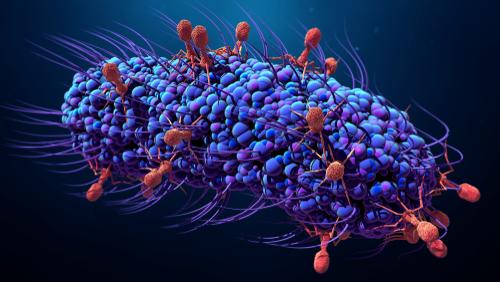Belgian company Vésale Bioscience has received €1.8 million ($1.9 million) in grants from the European Innovation Council (EIC) Accelerator Fund for its PhageDiag project, a phagogram using artificial intelligence that enables decentralized diagnostics and personalized treatment.
According to the World Health Organization (WHO), antimicrobial resistance (AMR) is one of the top 10 global public health threats facing humanity.
The EIC Accelerator jury said: “Vésale Bioscience is tackling the AMR global issue by developing a clear diagnosis that allows a personalized phage treatment which potentially gives a higher rate of success.”
Vésale Bioscience’s selected project, PhageDiag, is a fast and user-friendly diagnostic technology, or phagogram, for personalized phage therapy. It is the first automated in vitrodiagnostic tool that enables a quick determination of suitable bacteriophages for treating a particular bacterial infection. PhageDiag consists of a basic test kit (a disposable well plate with reagents), a high-performance luminometer and a dedicated software that offers the best matching phage combination to treat the patient, using artificial intelligence.
Vésale Bioscience’s PhageDiag enables personalized therapy
“Personalized phage therapy using magistral preparations of phages is among the most promising solutions to fight antimicrobial resistant infections. This approach requires a rapid diagnostic test to identify the pathogens involved in the infection and choose the phages that would be active on them,” said Johan Quintens, chief scientific officer at Vésale Bioscience.
“Unlike current diagnostic methods, which take up to four to seven days, the PhageDiag phagogram compares the activity of up to 96 phages on a bacterial culture within two to three hours, making phage susceptibility testing accessible for hospital microbiology labs and enabling personalized therapy on a routine basis.”
“We work in close collaboration with the Belgian regulators. This was an additional factor in the EIC Accelerator jury’s decision to award us this grant for our PhageDiag project. It allows us to act as a ‘test’ case for Europe,” said Gunther Vanwezer, CEO of Vésale Bioscience.
The EIC is Europe’s flagship innovation program to identify, develop and scale-up breakthrough technologies and game changing innovations. More than 1,000 start-ups and SMEs (small and medium enterprises) submitted applications to obtain funding from the EIC this year. Vésale Bioscience is among the 78 companies the EIC Accelerator selected at the end of 2022 to receive a grant.
About antimicrobial resistance
According to the WHO, antibiotic resistance is one of the greatest threats to global health today. Resistance occurs when bacteria evolve in response to the use of antibiotics, thereby substantially impairing the effectiveness of the treatment. As a result, the bacteria become resistant and cause infections, in both animals and humans. These infections are harder to treat than those caused by non-resistant bacteria. The economic cost of treating patients affected by multidrug-resistant bacteria could reach $100 billion by 2025.
About the EIC Accelerator
The EIC Accelerator supports individual SMEs, in particular startups and spinout companies, to develop and scaleup game-changing innovations. In some cases, small mid-caps (up to 500 employees) are supported. EIC selected companies receive coaching, mentoring, access to investors and corporations, and other opportunities.
The EIC Accelerator provides financial support with grant funding (non-dilutive) of up to €2.5 million ($2.65 million) for innovation development costs and investments (direct equity investments) of up to €15 million ($16 million), managed by the EIC Fund, for scale up and other relevant costs. Companies working on technologies of strategic European interest can apply for EIC investments of more than €15 million.





